|
Novelists are often advised to write a killer first line, a hook so powerful it'll drag the reader by the throat into the rest of the book. It's the old adage of making a good first impression, this time in literary form. Here's Stephen King's opinion on the subject: 'An opening line should invite the reader to begin the story. It should say: Listen. Come in here. You want to know about this.' Hard to argue with that! As part of the 'Five' series, in this week's post I'm examining five great opening sentences from novels. 1. The Crow Road - Ian Banks (1992) 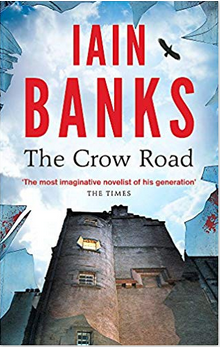 'It was the day my grandmother exploded.' Wow, what a kicker first line! Followed by: 'I sat in the crematorium, listening to my Uncle Hamish quietly snoring in harmony to Bach's Mass in B Minor, and I reflected that it always seemed to be death that drew me back to Gallanach.' Not bad for a second line, either! The rest of the book doesn't disappoint. I have a love/hate relationship with Iain Banks's novels, having loathed 'The Wasp Factory', been ambivalent about 'Stonemouth', and awed by 'The Crow Road'. The latter is the story of Prentice McHoan, who seeks answers about the disappearance of his uncle eight years ago. The Crow Road is the name of the book Prentice's uncle, Rory, was writing when he vanished, and is also a metaphor for death. Along the way Prentice questions the existence of God and the afterlife, fuelled by sex, drink, and illegal substances. It's a great read! 2. Middlesex - Jeffrey Eugenides (2002) 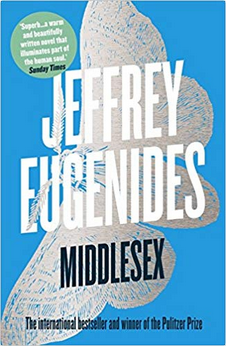 'I was born twice: first, as a baby girl, on a remarkably smogless Detroit day in January of 1960; and then again, as a teenage boy, in an emergency room near Petoskey, Michigan, in August of 1974.' Well, that's intriguing! Right from the start, we're made aware that 'Middlesex' is a story of intergender life, if the title didn't make it obvious. But why did the protagonist's second birth take place in an emergency room? Jeffrey Eugenides's clever opening salvo makes me keen to discover more.... 'Middlesex' is the story of Calliope Stephanides and her strange family secret. Calliope later becomes Cal, the narrator of the novel. He/she is an intersex individual raised as a girl, but who, hormonally speaking, is male. Growing up in 1970s Michigan, Cal/Calliope's story is set against a background detailing the experiences of Greek immigrants in the United States, and the fortunes of Detroit. 'Middlesex' won the 2003 Pulitzer Prize for Fiction. The book was also shortlisted for the National Book Critics Circle Award and the International Dublin Literary Award. 3. Nineteen Eighty-Four - George Orwell (1949) 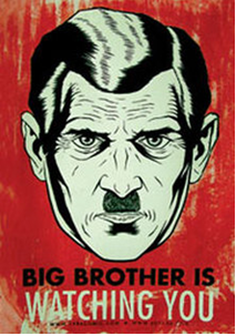 'It was a bright cold day in April, and the clocks were striking thirteen.' Regular readers of my blog will already know the high regard in which I hold this novel, ever since its story of dystopian tyranny stunned me when I read it as a teenager. And what a great opening line! Who wouldn't read that last word and think 'huh?' From the start, Orwell makes us aware we're entering a strange and disturbing world, one that's familiar and at the same time different. A world in which the calendar months haven't changed, but the way we tell time has. We're all conversant with the twenty-four hour clock, yet the way Orwell uses it grabs our attention. By a simple word trick, he sets the scene for life on Airstrip One, formerly Great Britain. A world in which, to quote from the book, 'who controls the past controls the future: who controls the present controls the past'. Enter Winston Smith, whose job it is to rewrite the past, despite inwardly rebelling against life in totalitarian Britain.'1984' is a grim read in places, especially the interrogation scenes, but it's deservedly a classic. 4. The Bell Jar - Sylvia Plath (1963) 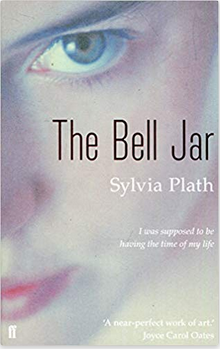 'It was a queer, sultry summer, the summer they electrocuted the Rosenbergs, and I didn't know what I was doing in New York.' In one sentence, Plath sets the scene: it's summer, it's 1953, our protagonist is in New York, and we already know she's confused. 'The Bell Jar' is not an easy read, being partly based on Plath's own experiences with mental illness. It's the story of Esther Greenwood, a young woman who wins an internship on a New York fashion magazine. At first, she's delighted, believing she'll finally achieve her dream of becoming a writer. The fast pace of New York only serves to frighten her, though, and she has no idea what to do with her life. The only alternatives appear to be motherhood or a job as a stenographer, neither of which appeal. Gradually, Esther's life slides out of control. She spirals into depression, the bell jar of the book's title being a metaphor for her mental prison. 'The Bell Jar', Sylvia Plath's only novel, was originally published in 1963 under the pseudonym Victoria Lucas. Plath committed suicide shortly after the book's UK publication. 5. Earthly Powers - Anthony Burgess (1980) 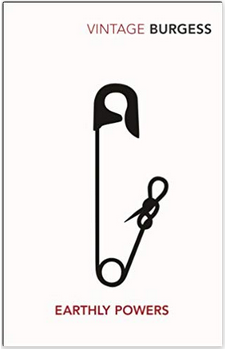 'It was the afternoon of my eighty-first birthday, and I was in bed with my catamite when Ali announced that the archbishop had come to see me.' So much information wrapped up in one sentence! What strikes me the most is the word 'catamite', a word we seldom hear nowadays, meaning it's immediately attention grabbing. Then there's the fact our protagonist tells us he's eighty-one. Ageism is alive and well in our society; many people write off the elderly as being past sex, but this one clearly isn't. Throw religion into the mix in the shape of the visiting archbishop, and Burgess gives us a masterly opening to his novel. 'Earthly Powers' tells the story of Kenneth Toomey, a novelist who embarks on writing his memoirs. Toomey is also asked by the Archbishop of Malta to help with the canonisation of Carlo Campanati. Campanati uses his guile to rise through the ranks of the Catholic Church; Burgess uses him to illustrate the lust for power and what men will do to attain it. Power, sex and religion - the stage is set for a great read! Do you have any favourite opening lines from novels? Leave a comment and let me know!
1 Comment
|
Categories
All
Subscribe to my blog!
Via Goodreads
|
Join my Special Readers' group and receive a free copy of 'Blackwater Lake'!
|
Privacy policy Website terms and conditions of use
Copyright Maggie James 2018 - current date. All rights reserved.
Copyright Maggie James 2018 - current date. All rights reserved.
 RSS Feed
RSS Feed
